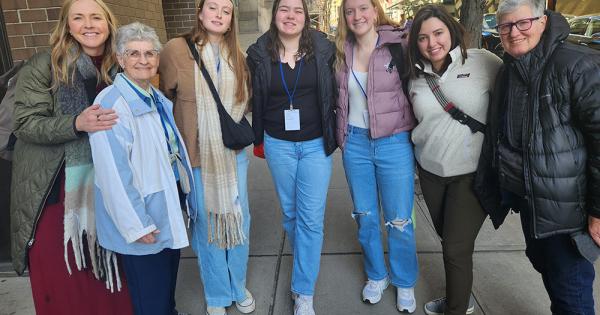Note from the Editor: This article is part of Global Sisters Report’s extensive series, “Out of the Shadows: Confronting Violence Against Women,” highlighting the responses of Catholic sisters to this worldwide crisis.
Catholic sisters, together with thousands of women from around the globe, recently convened at the United Nations to commemorate the 30th anniversary of the pivotal 1995 Beijing Declaration and Platform for Action. Their gatherings celebrated sisterhood while also assessing the serious challenges that persist.
During the 69th session of the U.N. Commission on the Status of Women (March 10-21), which focused on evaluating the impact of the Beijing legacy, sisters shared their insights on the progress made in various areas for women and girls, alongside the enduring obstacles they face. Many expressed concern over the resurgence of authoritarianism and misogyny worldwide.
“CSW69 highlighted the urgent reality of women’s rights being rolled back in many regions,” remarked Sr. Michelle Loisel of the Company of the Daughters of Charity of St. Vincent de Paul, who represented her congregation at the U.N.
“Access to education and employment remains restricted. Women are disproportionately affected by economic downturns, notably in the Global South,” Loisel stated in an interview with Global Sisters Report.
This sentiment echoed through the remarks of Gabriella Gambino, under-secretary of the Dicastery for Laity, Family and Life, who led the Holy See delegation to the Commission. “Equality necessitates not just acknowledgement of women’s dignity but the creation of real opportunities. Poverty eradication is crucial, as it deeply impacts women’s lives, where neither development nor peace will exist if their dignity is constrained by poverty,” Gambino emphasized during her address on March 13.
Sr. Janet Palafox conveyed the imperative that rights are not safeguarded automatically: “We must actively fight to protect them. We have to support one another in this effort.”
Loisel added that, despite gradual progress, it’s critical not to lose hope. With the multitude of ongoing global crises—armed conflicts, climate change, economic instability, and pervasive gender-based violence—the Commission served as a crucial platform for advocates to rally for greater commitments to women’s rights and meaningful change.
Women’s Rights Are Under Threat
The political declaration from the Commission pointed out that three decades post-Beijing, “no nation has fully realized gender equality and women’s empowerment.” It noted that progress toward key concerns has been slow and inconsistent, with significant barriers still in place, such as discriminatory laws and deeply ingrained gender stereotypes.
The document underscores the alarming persistence of all forms of violence and discrimination against women and girls, including domestic violence and the feminization of poverty. It also highlighted the continued global inequalities, including the underrepresentation of women in decision-making roles, where many experience intersecting forms of discrimination and marginalization throughout their lives.
In his opening remarks, U.N. Secretary-General António Guterres emphasized that “women’s rights are under siege,” asserting that the resurgence of patriarchal structures poses severe obstacles to progress. He urged those passionate about equality to take action, stating, “The antidote is action.”
“There can be neither development nor peace if the dignity of women is undermined by poverty.”
— Gabriella Gambino
Tweet this
The need for action was reiterated during various parallel events held outside U.N. headquarters. At a gathering on March 20 focused on the rights of women facing forced migration, Monica Santamarina, president of the World Union of Catholic Women’s Organizations, highlighted the escalating levels of human mobility affecting millions of women. She reported that 41% of international migrants increased between 2000 and 2015, reaching 244 million, with nearly half being women.
Despite facing issues such as gender-based violence and health-related challenges, Santamarina noted that women migrants significantly contribute to both their home and host communities’ social, economic, and cultural development.
Sr. Ngozi Frances Uti from the Congregation of the Handmaids of the Holy Child Jesus shared insights from Nigeria, where many are migrating due to armed conflict and climate change. She remarked that women often bear the brunt of violence, facing severe threats such as rape and abduction.
However, Uti emphasized that the migration journey can also reflect positive changes for women, moving from passive roles to active economic contributors through remittances, while not ignoring the vulnerabilities they face during the migration process.
Transforming Laws and Cultural Norms
Issues of vulnerability and violence were recurrent themes during the Commission, as highlighted by sisters with extensive advocacy experience at the U.N. Sr. Durstyne “Dusty” Farnan and Sr. Jean Quinn voiced concerns over the non-enforcement of protective laws, stressing that “laws are only effective when enforced.” They called for not only changes in legislation but also a transformation in cultural attitudes toward gender equality.
Despite progress in visibility surrounding violence against women, many issues remain hidden. “Violence is still prevalent,” declared Sr. Jean Quinn, insisting that women need more opportunities to share their stories at public forums.
“Laws are only as good as their enforcement. We need to change laws but we also need to change the culture.”
— Adrian Dominican Sr. Durstyne “Dusty” Farnan
Tweet this
Reflecting on the Commission’s discussions, participant Sr. Kayula Lesa remarked that many topics raised were recurring, emphasizing the urgent need for “more action than talk” across all levels of advocacy.
Sr. Roberta White echoed this sentiment, reacting with profound concern to statistics indicating the highest levels of violent conflict since World War II, affecting a quarter of the global population. “We must support and fund peace movements for the younger generations,” White insisted, encouraging continued action against any regression in women’s rights.
As the conversation continued, a collective call emerged: “Do not give up. Keep pushing back,” affirming a unified resolve to strive for lasting change in women’s rights.


